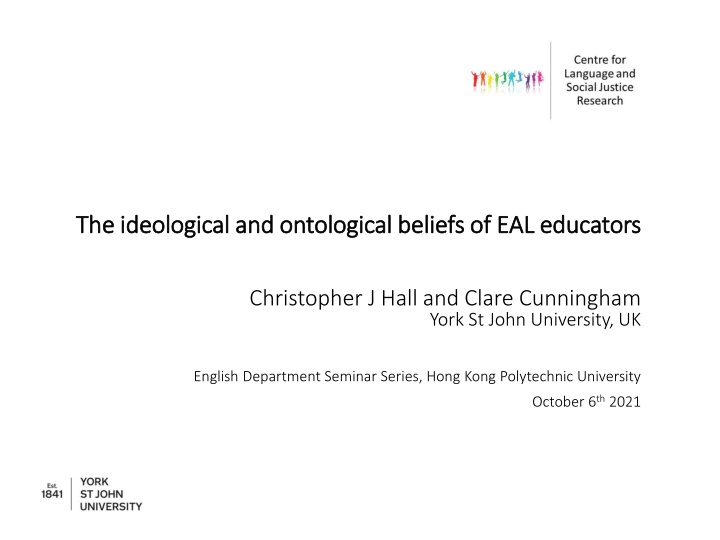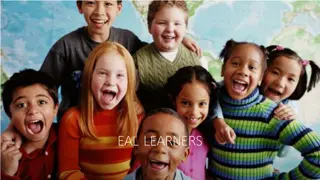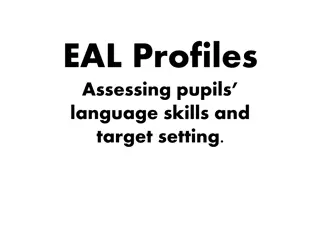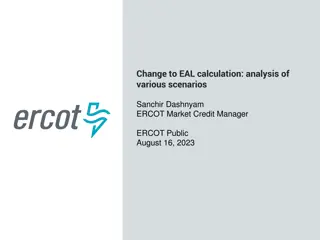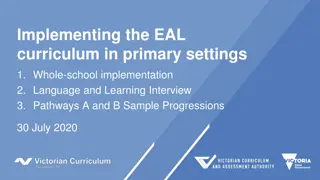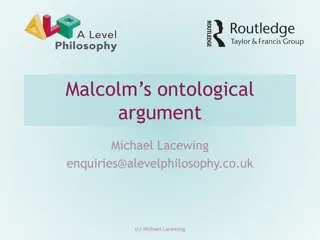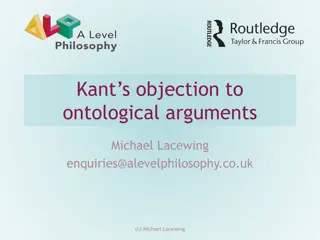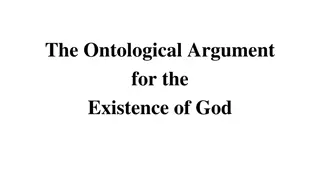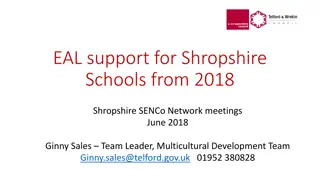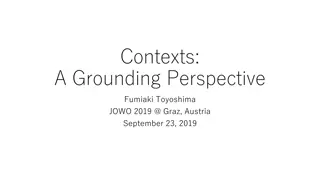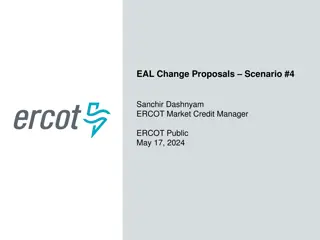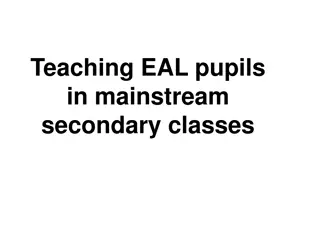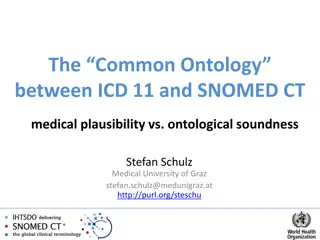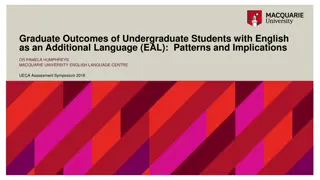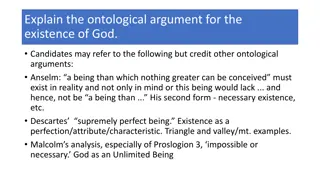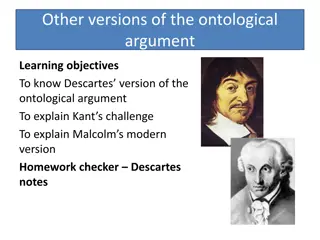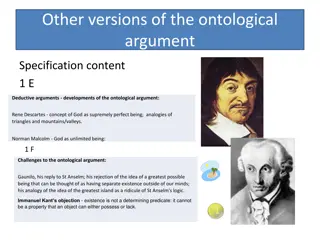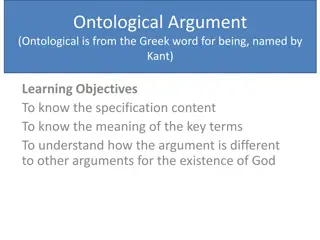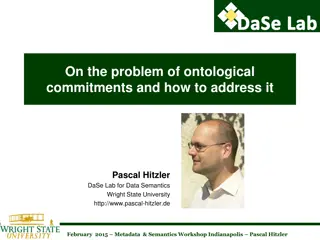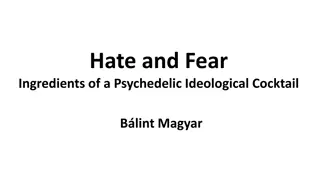Ideological and Ontological Beliefs of EAL Educators
The study delves into the ideological and ontological beliefs of EAL educators, exploring their perspectives on language ideologies, societal norms, and educational practices. Previous research emphasizes the impact of teacher beliefs on language learning environments, shedding light on the interconnectedness of linguistic resources, social realities, and ideological constructs. Through a comprehensive analysis, the researchers aim to uncover the implications of these beliefs in EAL education.
Download Presentation

Please find below an Image/Link to download the presentation.
The content on the website is provided AS IS for your information and personal use only. It may not be sold, licensed, or shared on other websites without obtaining consent from the author.If you encounter any issues during the download, it is possible that the publisher has removed the file from their server.
You are allowed to download the files provided on this website for personal or commercial use, subject to the condition that they are used lawfully. All files are the property of their respective owners.
The content on the website is provided AS IS for your information and personal use only. It may not be sold, licensed, or shared on other websites without obtaining consent from the author.
E N D
Presentation Transcript
The ideological and ontological beliefs of EAL educators The ideological and ontological beliefs of EAL educators Christopher J Hall and Clare Cunningham York St John University, UK English Department Seminar Series, Hong Kong Polytechnic University October 6th2021
Outline Previous research Beliefs and attitudes Ideology and ontology Research context and design Analysis Ideological beliefs Ontological beliefs Discussion and implications
Previous research Most work on teacher beliefs and attitudes has concentrated on learners/learning and teachers/teaching (cf. Fives and Gill, 2015), rather than linguistic resources and practices and the social realities they are embedded in. [T]eachers beliefs and attitudes tend to be treated in the literature as overly psychologized apolitical constructs that [...] reflect personality types, individual values, and personal predispositions that have little to do with the larger political, ideological, social, and economic order. Alfaro and Bartolom (2017, p. 16) Work on teacher beliefs about/attitudes to English increasingly focuses on issues of social (in)justice deriving from dominant language ideologies, both in NS contexts (e.g. Blake and Cutler, 2003; Baratta, 2018) and contexts of bilingualism and translanguaging (e.g. Rosa, 2016; Alfaro and Bartolom , 2017; Fitzsimmons et al., 2017).
Previous research Language ideologies are closely enmeshed with national ideologies (Anderson, 1983; Harris, 1981; Haugen, 1966; Joseph, 2004; Makoni and Pennycook, 2007). [The national ideal] demands that there be a single linguistic code by means of which communication [within the nation] can take place . Haugen (1966, p. 928) Cunningham (2017, 2018, 2019b) has investigated ideological beliefs about English and languages beyond English (LBEs) (2019a) in the EAL context, finding an engrained monolingual habitus and an unquestioned belief in the sole legitimacy of Standard English for schooling. In applied linguistics, ontologies of language/s have been discussed by Seargeant (2008), Cook (2010), Makoni and Pennycook (2007), Otheguy et al. (2015), Ortega (2018). Only Hall (2013; 2020; in press), Hall et al. (2017), and the collection edited by Hall and Wicaksono (2020) have concentrated on teacher ontologies of English.
Ideology and ontology Ideological beliefs Ideological beliefs are those pertaining to ideologies, broadly understood as systems of ideas or meanings which constitute individual and group world views or social practices, often tied to value assignment, positioning or group interest, and therefore involving power relations (cf. Woolard, 1998; Van Dijk, 2013). Ontological beliefs Ontological beliefs concern the physical, mental and social entities that are under- stood to exist (or not) in the world: their nature, status, and the relationships between them (cf. Searle 1995; Lawson 2014).
Previous research [T]eachers beliefs and attitudes tend to be treated in the literature as overly psychologized apolitical constructs that [...] reflect personality types, individual values, and personal predispositions that have little to do with the larger political, ideological, social, and economic order. Alfaro and Bartolom (2017, p. 16) [Language-teaching programmes] are conveying . . . a powerfully general misrepresentation of the nature of the language, what is entailed in knowing it, and what the basis for projecting and maintaining a standard language is [ ] Toolan (2009, p. 11)
Previous research [The national ideal] demands that there be a single linguistic code by means of which communication [within the nation] can take place . Haugen (1966, p. 928) The one-nation-one-language logic is shored up by the naturalised status of English as an international language , which deterritorialises English and deems it the property of the world and of whomever chooses to acquire it. Fortier (2017, p. 5) [T]he monolingual orientation which can be observed among teachers in [...] European schools is an intrinsic element of their professional habitus as members of the nation state school system Gogolin (1997, p. 42)
Previous research Since [...] individual people may be members of various ideological groups, their experiences (mental models) may feature sometimes contradictory personal opinions and other beliefs as influenced by different ideologies. Van Dijk (2013, p. 179) When considering the issue of English s role within the world [ ] one has to be sensitive both to the specific circumstances in which the language operates [internal ideology] and to the character of the research process [external ideology]. These are both constrained (to some extent) by the nature of (the) language itself. Seargeant (2008, p. 219) Any comprehensive world-view constitutes an ideology [...]: such a world view will contain both an ontology and a set of values. Sharpe (1974, p. 55)
Beliefs and attitudes Postures Convictions Ontological beliefs Ideological beliefs Attitudes Values
Research context and design Discursive data from larger study reported in Cunningham (2017, 2019, 2020). Semi-structured interviews with 32 educators in different roles from 7 primary schools and 1 education authority in the north of England, including teachers, head teachers, TAs, and EAL specialists. Research questions 1. What does an analysis of the attitudinal discourse of primary school educators in a UK context illuminate about their ideological beliefs regarding English and the languages beyond English of their students? 2. What does a re-interpretation of the discourse data suggest about educators ontological beliefs ontological beliefs about English and other languages in the light of their ideological beliefs? 3. What is the nature of the relationship between the ideological and relationship between the ideological and ontological beliefs ontological beliefs identified in the discourse data? ideological beliefs
Research context and design Transcripts were analysed using APPRAISAL framework (Martin 2000; Martin & White 2005), an approach that extends Halliday s Systemic Functional Linguistics to explore, describe and explain how language is used to express attitudes, to evaluate and to judge.
Research context and design Transcripts were coded as below: Original analysis led to the inference of prevalent ideological beliefs. Subsequent ontological re-interpretation identified implied conceptualizations of English and other languages, and of nation and national identity, and the values associated with them.
Analysis of ideological beliefs APPRAISAL analysis suggests that two sets of inter-related ideological beliefs prevail in teachers discourses: 1. A hegemonic stance towards English, deriving from the one nation, one language ideology (cf. Piller, 2015) and the monolingual habitus (Gogolin, 1997), and implicit endorsement of the belief that learning and using English as an additional language is characterized by deficit. 2. Association of languages beyond English with different levels of cultural capital, thus implying a hierarchy of languages (with English at the top). The attribution of relative value to languages follows from educators monolingual habitus, associating individual languages with individual communities in a one-to-one relationship, such that languages inherit the perceived status of their (native) speakers (Le Page & Tabouret-Keller 1985), and multilingualism as a natural state is denied.
Ideological analysis 1. English is (always) primary English is (always) primary - many educators believe unquestioningly Other languages are so excluded that they can be rendered completely invisible. Kelly, the EAL co-ordinator at school 2, refers to people who ve got no language at all when they come and Irene, the Head at school 4, describes children coming in in year three with no no language (negative CAPACITY). Similarly, Tina refers to the brother of a student who accelerated learning very rapidly from no no language [ ] to lots of languages [ ] within six to ten weeks no The exclusionary stance is made explicit in the following comment: Luke: We emphasize the importance of English because that s the dominant language in the country and for children to make progress and to do well in their future lives they need to be good communicators.
Ideological analysis 2. English is equated with language in general. Thomas, talks about EAL students maybe being transferred ( bussed ) to schools where there are better native-speaker role models and returning when they ve got more language . Marie speaks of the possibility of children entering school with a lower level of language Luke mentions the difficulties that EAL children have in processing language . Lucy s characterization of parents English using the phrase their language was poor . She goes on to say: Dad was very good at English English. Mum couldn t speak it it at all and the little boy was somewhere in the middle, so we had something, and Michael the little Polish boy - Dad could speak, Mum couldn t Dad could speak, Mum couldn t. Maybe it is a cultural thing - Dads can all speak, Mums can t Dads can all speak, Mums can t, mainly
Ideological analysis 3. LBEs are situated within a hierarchy of languages The distinction between more valuable languages legitimized by being taught in schools and less valuable languages brought to schools from home is clear here Habib: Y knowwe are working here because we ve got another language. If I couldn t, I might not be working here! [ ] so it s an asset an y know, people go an learn Chinese an you know the languages people go an learn Chinese an you know the languages - - you learn French but our children think oh no, you know, first language (Oraiba: because they ve all practically got it so they don t think it s they ve all practically got it so they don t think it s ) (Interviewer: that it s anything special). you learn French Chinese and French are languages which people go and learn (as school subjects), whereas the children s own languages are perceived as less valuable assets in a multilingual combination.
Ideological analysis 4. Cultural heritage implicitly construed as monolingual Lucy: I think keeping their natural language natural language is an extremely important characteristic. It s part of their culture, it s who they are, it s what they are, it s what makes them unique. Helen: language is a big part of your own identity [ ] it s like something you pass down down like the colour of your eyes an things like that an I think it s a really important thing and for those children to not have it then I think will have an impact especially on how they re going to fit in to wherever they belong. The positive VALUATION expressions suggest almost a genetic or biological link between the children s heritage language and their identities, emphasizing the naturalizing effect of the ideology. Losing their first language = losing their identity EAL children are thus constructed as being inevitably defined by their home languages This helps explain the positioning of EAL children as essentially problematic , because they face the considerable challenge of a transition from their natural state. pass
Ideological analysis 5. Home languages are constructed as having only qualified or subordinate worth Kelly states that parents should continue to use first language because that will improve the children s second language (PROPRIETYJUDGEMENT). Sheila comments on migrants failure to understand that to learn English they need to preserve their first language Marie says development of language in their first language [ ] will help [ ] cos they can then reinforce that in English as well . Elsewhere, children s use of languages beyond English is sanctioned for in- group rapport maintenance in the playground, especially. The attitude expressed is that home languages are restricted to narrow social domains or subject to external Anglophone supervision, which we see below Kelly says: they ve got to learn to use it appropriately so in our school at the moment there isn t a culture of it - of children being allowed to use it without there being a bilingual member of staff there to sort of oversee it
Ontological framework Basic distinction (cf. Hall, 2020; Otheguy, 2015) between language conceptualized as: 1. a general socio-cognitive phenomenon (and hence English[es] as instantiations of this); 2. a collection of distinct named codes associated with different nations (of which English is one). English exists in these two senses by virtue of: 1. the existence of language as a human capacity, independent of our awareness of it; 2. the original existence of a group of people perceiving themselves as a nation, the English , and those who now trace a cultural lineage with this group.
Ontological propositions Beliefs about English (1): A. Proper English people speak proper English. Thomas If you look at the school where I am, my indigenous white children also have unenriched language. Fiona Obviously as a teacher my aim is to make sure the children can speak English properly and there s some children even from this country that struggle to do that. Kate [T]o be honest their [ white children s ] English was as poor as the English second language [students]. Irene They can speak perfectly good and functional English, but you would never think they are English Kate [T]he women with burkas and everything else like that y know that [...] don t speak any English.
Ontological propositions Beliefs about English (1): B. In England, if you don t have English, you re linguistically impaired. Kelly people who ve got no language at all when they come. Irene [children] coming in in year three with no language. Tina a student s brother who accelerated learning very rapidly from no language [...] to lots of languages [...] within six to ten weeks. Thomas children returning to school when they ve got more language. Luke the difficulties that EAL children have in processing language
Ontological propositions Beliefs about languages beyond English: C. In England, if you re not English and have other languages, they re components of your identity, not your linguistic ability. Lucy I think keeping their natural language is an extremely im- portant characteristic. It s part of their culture, it s who they are, it s what they are, it s what makes them unique. Helen language is a big part of your own identity [...] it s like something you pass down like the colour of your eyes an things like that an I think it s a really important thing and for those children to not have it then I think will have an impact especially on how they re going to fit in to wherever they belong. Katherine I feel it s very important that they keep [...] who they are (our emphasis).
Ontological propositions Beliefs about languages beyond English: D. In England, other languages you learn are school subjects, independent of social identity and use. Luke We encourage the children to swi- or- not- it hasn t been the case over this last year, probably for several years, I ve been er promoting French, so the children have been picking up French very easily specially the EAL children because they re already used to the idea. Habib Y know we are working here because we ve got another language. If I couldn t, I might not be working here! [...] so it s an asset an y know, people go an learn Chinese an you know the languages - you learn French but our children think oh no, you know, first language
Ontological propositions Beliefs about English (2): E. In England, if you learn English but aren t English, your English is viewed in terms of how well it matches the linguistic system of the standard variety, independently of effective use. Luke shared responsibility for identifying problems and then trying to find ways to remedy the problems so the interventions are something that are ongoing all the time but they re in response to how we perceive the needs. Sarah Part of the identification process was actually going okay, some children are on step five who you might not notice, but when you look at their writing or when they get further up, you re going to notice. And we just need to hunt them down somewhere and for teachers to know who they are.
Conclusion Educators conceptualize English in conflicting also Kroskrity, 2004; Van Dijk, 2013; Fitzsimmons-Doolan et al., 2017; Weaver, 2019). Proposition A captures the default, entrenched ontological commitment, according to which the legitimate manifestation of language in England is conceptualised not as a communicative resource, but as Standard English, an index of national identity (N-English). Proposition B reverses the ontological categories for non-English people, viewing lack of (competence in) English in terms of lack of communicative resource altogether, rather than simply lack of regulative norms. Propostion E holds that when non-English people do have competence in English, then it s conceptualised again as a set of regulative norms, i.e. in deficit terms, rather than as communicative resource. This selective and subconscious conflation of language as resource and language as national identity marker contributes to the perpetuation of social injustice. conflicting and inconsistent inconsistent ways (cf.
Implications Just as Alfaro and Bartolom (2017, p. 12) call for bilingual educators to develop their ideological clarity in parallel with their pedagogical expertise , we advocate the development of ontological clarity and other language educators. Some specific goals could include: delinking the ontological categories of LANGUAGE appreciating English as plurilithic rather than monolithic; recognising the ambiguity of the word rule (as in the rules of English). Suggestions for activities can be found in Hall & Cunningham (2020), drawing on ideas for TESOL practitioners in Hall & Wicaksono (2020b) an online course at changingenglishes.online changingenglishes.online and Hall (in press). ontological clarity for EAL LANGUAGE and NATION NATION;
References Alfaro, C. and Bartolome , L. (2017). Preparing ideologically clear bilingual teachers: honoring working- class non-standard language use in the bilingual education classroom. Issues in Teacher Education, 26, 2, 11 34. Cunningham, C. (2017). Saying more than you realise about EAL : discourses of educators about children who speak languages beyond English. Unpublished PhD Thesis. University of York, UK. Cunningham, C. (2019a). Terminological tussles: taking issue with 'EAL' and 'languages other than English. Power and Education, 11 (1): pp. 121-128. Cunningham, C. (2019b). The inappropriateness of language : discourses of power and control over languages beyond English in primary schools. Language and Education, 33, 4, 285-301. Cunningham, C. (2020). When home languages become holiday languages : teachers discourses about responsibility for maintaining languages beyond English, Language, Culture and Curriculum, 33, 3, 213-227. Department for Education. (2018). Schools, Pupils and Their Characteristics. Online. Retrieved 28/05/21 from https://assets.publishing.service.gov.uk/government/uploads/system/uploads/attachment_data/f ile/719226/Schools_Pupils_and_their_Characteristics_2018_Main_Text.pdf. Fitzsimmons-Doolan, S., Palmer, D. and Henderson, K. (2017). Educator language ide- ologies and a top top- down dual language program. International Journal of Bilingual Education and Bilingualism, 20, 6, 704 721. Fortier, A. M. (2017). On (not) speaking English: colonial legacies in language requirements for British citizenship. Sociology, 52, 6, 1254-1269. Gkaintartzi, A., & Tsokalidou and (2011). She is a very good child but she doesn t speak : the invisibility of children s bilingualism and teacher ideology . Journal of Pragmatics, 43, 2, 588 601. -
References Gogolin, I. (1997). The Monolingual Habitus as the common feature in teaching in the language of the majority in different countries. Per Linguam, 13, 2, 38 49. Hall, C. J. (In press). Incorporating ontological reflection into teacher education about English for global learners: a rationale and some guiding principles, In Bayyurt, Y. (Ed.), World Englishes: Pedagogy. London: Bloomsbury. Hall, C. J. (2020). An ontological framework for English. In Hall, C. J. and Wicaksono, R. (eds), Ontologies of English. Conceptualising the language for learning, teaching, and assessment (pp. 13-36). Cambridge: Cambridge University Press. Hall, C. J. and Cunningham, C. (2020). Educators beliefs about English and languages beyond English: from ideology to ontology and back again. Linguistics and Education, 57, 1-14. Hall, C. J. and Wicaksono, R. (Eds) (2020a). Ontologies of English. Conceptualising the language for learning, teaching, and assessment. Cambridge: Cambridge University Press. Hall, C. J. and Wicaksono, R. (2020b). Changing Englishes. An online course for teachers (v.02.2). Online. Available at www.changingenglishes.online. Hall, C. J., Wicaksono, R., Liu, S., Qian, Y. and Xu, X. (2017). Exploring teachers ontologies of English. Monolithic conceptions of grammar in a group of Chinese teachers. International Journal of Applied Linguistics, 27, 1, 87 109. Haugen, I. (1966). Dialect, language, nation. American Anthropologist, 68, 922-935. Heller, M. P. (2007). Bilingualism as ideology and practice. In M. P. Heller (ed.), Bilingualism: a Social Approach. Palgrave Macmillan.
References Helot, C. and Young, A. (2002). Bilingualism and Language Education in French Primary Schools: Why and How Should Migrant Languages be Valued? International Journal of Bilingual Education and Bilingualism, 5, 2, 96 112. Kroskrity, P. (2004). Language ideology. In A. Duranti (ed.), Companion to linguistic anthropology. Oxford: Blackwell. Lawson, T. (2014). A conception of social ontology. In S. Pratten (Ed.), Social ontology and modern economics. London: Routledge. Le Page, R. B. and Tabouret-Keller, A. (1985). Acts of Identity. Creole-based Approaches to Language and Ethnicity. Cambridge: Cambridge University Press. Martin, J. R. (2000). Beyond exchange: Appraisal systems in English. In S. Hunston and G. Thompson (eds), Evaluation in Text: Authorial stance and the construction of discourse. Oxford: Oxford University Press. Martin, J. R. and White, P. (2005). The Language of Evaluation: APPRAISAL in English. London: Palgrave Macmillan. Milroy, J. (2001). Language ideologies and the consequences of standardization. Journal of Sociolinguistics, 5, 4, 530 555. Otheguy, R., Garci a, O. and Reid, W. (2015). Clarifying translanguaging and decon- structing named languages: A perspective from linguistics. Applied Linguistics Review, 6, 3, 281 307. Pettit, S. K. (2011). Teachers Beliefs About English Language Learners in the Main- stream Classroom: A Review of the Literature. International Multilingual Research Journal, 5, 123 147.
References Piller, I. (2015). Language ideologies. In K. Tracy (ed.), The International Encyclopedia of Language and Social Interaction. London: John Wiley and Sons. Seargeant, P. (2008). Language, ideology and English within a globalized context. World Englishes, 27, 2, 217 232. Searle, J. R. (1995). The Construction of Social Reality. New York: Simon and Schuster. Sharpe, R. A. (1974). Ideology and ontology. Philosophy of the Social Sciences, 4, 55 64. Toolan, M. (2009). Introduction: Language teaching and Integrational Linguistics. In M. Toolan (ed.), Language Teaching. Integrational Linguistic Approaches. London: Routledge. Van Dijk, T. A. (2013). Ideology and discourse. In M. Freeden, L. Tower Sargent and M. Stears (eds), The Oxford Handbook of Political Ideologies. Oxford: Oxford University Press. Weaver, M. (2019). I still think there s a need for proper, academic, Standard English : Examining a teacher s negotiation of multiple language ideologies. Linguistics and Education, 49, 41 51. Woolard, K. A. (1998). Introduction. Language ideology as a field of inquiry. In B. B. Schieffelin, K. A. Woolard and P. V. Kroskrity (eds), Language Ideologies: Practice and Theory. Oxford: Oxford University Press. Thank you for listening Thank you for listening questions welcome! questions welcome!
